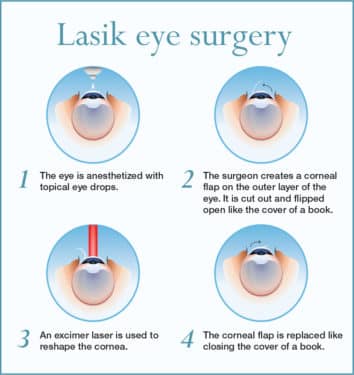Posted By-Hollis Reece
If you're contemplating SMILE eye surgery, contemplate this: are you prepared to accept prospective visual liberty, or does the thought of any type of dangers make you be reluctant? Your decision will hinge on a careful equilibrium of considering the benefits versus the unpredictabilities. It's vital to delve deeper right into the subtleties of SMILE surgery to make an informed selection that aligns with your visual objectives.
Comprehending SMILE Eye Surgery
When thinking about SMILE Eye Surgical procedure, it's important to understand the treatment and its benefits. SMILE, which represents Small Laceration Lenticule Removal, is a minimally intrusive laser eye surgical treatment that corrects usual vision issues like myopia (nearsightedness).
Throughout the procedure, your eye specialist will certainly utilize a femtosecond laser to develop a small incision in your cornea. With visit this page , a little disc of tissue called a lenticule is gotten rid of, improving the cornea and fixing your vision.
Among the vital benefits of SMILE Eye Surgical treatment is its fast healing time. Lots of people experience boosted vision within a day or more after the treatment, with minimal pain.
Additionally, SMILE is known for its high success rate in giving long-lasting vision improvement. Unlike LASIK, SMILE doesn't require the creation of a flap in the cornea, decreasing the threat of complications and enabling a much more secure corneal framework post-surgery.
Understanding the treatment and its advantages is important when considering SMILE Eye Surgery for vision adjustment.
Advantages and disadvantages of SMILE
Considering SMILE Eye Surgical procedure for vision correction features various benefits and potential disadvantages.
Among the primary pros of SMILE is its minimally intrusive nature, as it includes a little laceration and commonly results in quick healing times. The procedure is additionally recognized for triggering marginal pain and completely dry eye symptoms post-surgery compared to other vision improvement techniques. In addition, SMILE has actually been shown to supply superb visual outcomes, with lots of people accomplishing 20/20 vision or far better.
On the other hand, a potential con of SMILE is that it might not be suitable for people with extreme refractive errors, as the treatment variety is rather minimal contrasted to LASIK. https://www.prweb.com/releases/leonard_bley_md_of_ny_lasik_is_the_first_and_only_surgeon_with_locations_in_manhattan_brooklyn_queens_to_offer_the_rxsight_light_adjustable_lens_to_cataract_patients/prweb18042870.htm to consider is that the learning contour for specialists implementing SMILE can impact the schedule of skilled providers in specific locations.
It is very important to consider these pros and cons meticulously when making a decision if SMILE is the appropriate option for your vision adjustment requirements.
Determining Eligibility for SMILE
To establish if you're eligible for SMILE eye surgical procedure, your ophthalmologist will certainly conduct a detailed examination of your eye health and vision demands. Throughout this evaluation, factors such as the security of your vision prescription, the density of your cornea, and the overall wellness of your eyes will be analyzed.
Usually, prospects for SMILE are over 22 years of ages, have a steady vision prescription for at least a year, and have healthy corneas without conditions like keratoconus.
Your optometrist will also consider your overall eye health and wellness, any existing eye problems, and your way of life needs to determine if SMILE is the best option for you. It's important to connect any type of details aesthetic requirements or worries you may have throughout this examination to make sure that the treatment lines up with your assumptions.
If you aren't qualified for SMILE, your eye doctor might suggest alternative vision correction alternatives that far better fit your private needs and eye wellness condition.
Final thought
Eventually, choosing whether SMILE eye surgery is right for you requires mindful consideration of your private eye wellness and visual needs. Talk to your ophthalmologist to identify your eligibility for the procedure and consider the prospective advantages and downsides. Remember to communicate any type of concerns or questions you might have throughout the assessment process to make an educated choice concerning your vision correction options.

